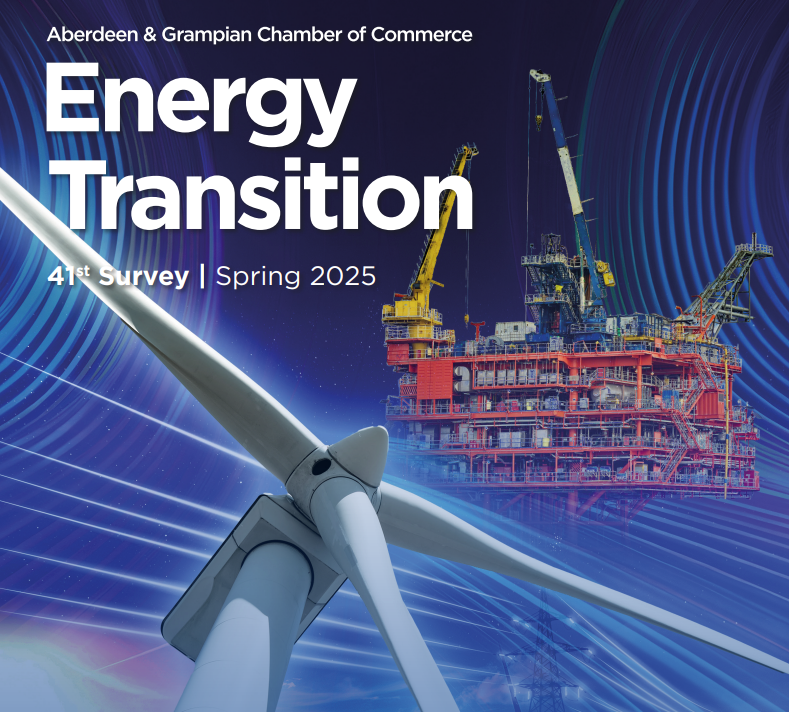New report shows UK is losing ‘mission critical’ net zero supply chain to foreign projects

The UK is losing the very skills and supply chain required to deliver its net zero ambitions, with a growing share of energy sector jobs, investment and innovation shifting abroad.
The 41st Energy Transition Survey, published today by Aberdeen & Grampian Chamber of Commerce, in association with Johnston Carmichael and D2Zero, shows an alarming exodus of activity and talent from the UK Continental Shelf (UKCS).
The survey of more than 100 firms active in basin reveals that two-thirds expect to increase headcount overseas in the next five years.
Almost half report staff already leaving the UK to work in other energy regions - triggered by weak domestic confidence, uncompetitive policy, and a lack of viable projects.
Alarmingly, firms anticipate that the majority of their work will be overseas by 2030 - with the tipping point coming around 2027-28.
Despite the UK’s stated ambition to lead the energy transition, the report shows that activity across renewables, electrification and decarbonisation technologies remains flat.
Companies warn that the current trajectory could permanently undermine the UK’s ability to deliver net zero using domestic supply chains.
Russell Borthwick, chief executive of Aberdeen & Grampian Chamber of Commerce, said: “This is a wake-up call for policymakers. We are training a world-class workforce and building the technology to lead the energy transition - but that talent and investment is increasingly being deployed overseas.
“You cannot deliver net zero by exporting your industrial base. If we continue to erode competitiveness through incoherent energy policy and excessive taxation, we risk offshoring the entire supply chain that is essential to the UK’s future energy system.”
Now in its 41st edition, the survey tracks industry confidence and activity trends across oil, gas and low-carbon energy. This year’s findings highlight a deepening crisis in domestic confidence, with the value of UKCS work falling across all five measured categories, including renewables.
The proportion of activity focused on oil and gas remains largely unchanged since 2022, while expectations for diversification by 2030 still fall short of what is needed to meet net zero goals.
Key findings include:
- 66% of firms expect to increase their overseas workforce by 2030
- 91% support new North Sea licences where emissions are lower than imports
- 89% say ending the Energy Profits Levy (EPL) would boost investment and jobs
- 90% believe the absence of a Scottish Government energy strategy is damaging investor confidence
- Almost half believe green energy roles will never fully replace lost oil and gas jobs
For the first time in the report’s 20-year history, market fundamentals like commodity price and demand have been displaced by UK policy as the top long-term concern for the sector. UK tax and licensing rules are now the first and third most pressing issues cited by respondents - both factors within domestic control.
Mr Borthwick added: “We’ve had enough consultations. The answers are already on the table. A coalition of trade unions, academics, business leaders and sustainability groups recently published a clear way forward through the North Sea Transition Taskforce. This is the solution government requires. The North Sea doesn’t need a bailout - just stability, vision and fairness.”
Mark Stewart, head of energy, infrastructure & sustainability at Johnston Carmichael, said: “This survey reinforces what we are hearing daily from the companies we advise: that uncertainty and inconsistency in UK energy policy are now bigger threats to investment than commodity prices or global market trends.
“The energy transition isn’t failing because of a lack of ambition - it’s failing because of a lack of execution. Businesses are ready to invest, innovate and diversify, but they need stable, predictable conditions to do so. Right now, the economics simply don’t stack up for many green projects.
“We are seeing a growing trend of skills, capital and capability moving overseas - particularly in areas like offshore wind, carbon capture and decarbonisation technologies. That’s deeply worrying, because it’s the same supply chain we’ll need to deliver a net zero system here in the UK.
“There’s still time to reverse that trend, but it will require faster project approvals, a stable tax regime, and coordinated policy leadership. If we can bridge the gap between today’s oil and gas activity and tomorrow’s clean energy projects, we can create a sustainable path forward for both our economy and the environment.”
Bob Drummond, CEO of clean energy group D2Zero, added: “The UK has the talent, the technology and the track record to lead the global energy transition - but we are now at serious risk of falling behind due to fragmented thinking and short-term policymaking.
“This report lays bare a critical truth: if we don’t act decisively, the infrastructure and ingenuity we need to build a low-carbon future will be deployed elsewhere. And once that capability is gone, it will be extremely difficult to rebuild.
“Energy transition isn’t a switch we flip overnight - it’s a series of complex, interconnected projects that require sustained momentum. A coordinated national delivery plan to bridge the gap between where we are and where we need to be will ensure progress is practical, investment is aligned, and no region or sector is left behind.
“From offshore electrification and carbon capture to advanced decommissioning and hydrogen, the UK has real advantages. We need to create the right environment to keep projects moving and capital flowing, to ensure high-value jobs and strategic independence.”
The Chamber is calling on UK and Scottish Governments to adopt the Taskforce’s recommendations, fast-track the Acorn carbon capture project, and create the conditions needed to stimulate investment across offshore wind, hydrogen, and grid capacity.
It also believes ending the EPL by 2025 and issuing targeted new licences could unlock billions in economic activity and protect thousands of high-value jobs.







